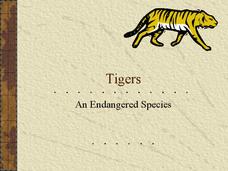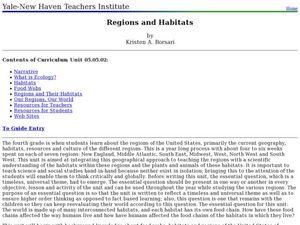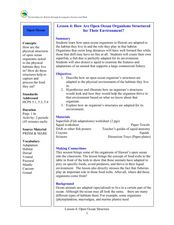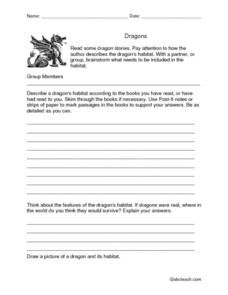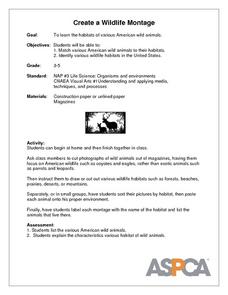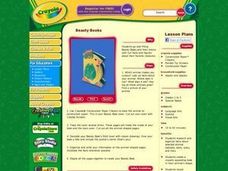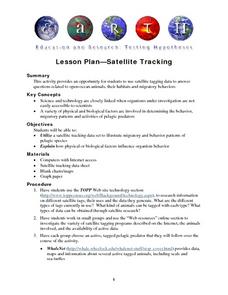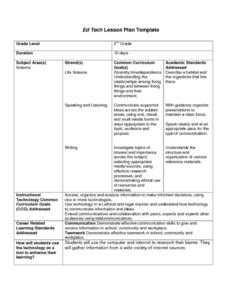Curated OER
What Do Koalas Need to Survive?
First graders take a field trip and examine the Koala and his habitat. In this Koala lesson, 1st graders read Possum Magic and discuss the foods of Australia. Students view the habitat of a Koala and record what it eats, its physical...
Smarter Balanced
Zoos
How do the experiences of animals living in zoos differ from animals living in the wild? To prepare for a performance assessment on this question, class members are introduced to key concepts and vocabulary, and then groups use a Venn...
National Wildlife Federation
Massive Migrations
Turn your students into flocks of migratory birds for this fun activity on animal migration. Prior to the activity, the teacher creates four different migration routes in the classroom or any available open space, labeling nesting...
Howard Hughes Medical Institute
Scientific Inquiry Using WildCam Gorongosa
How do scientists determine what questions to ask to meet their research goals? Help your class develop an inquiry mindset with a lesson based on studies in the Gorongosa National Park. Partners create their own research questions by...
Curated OER
Tigers: An Endangered Species
Facts about tigers are packed into a PowerPoint presentation about tigers. The presentation includes great photographs and accompanying text regarding the habitats, diet, lifespan, and physical attributes of tigers. Very interesting!
K12 Reader
An Interesting Animal
"Lions and tigers and bears, oh my!" Primary graders write about an animal that interests them, describing what it looks like, where it lives, and what it eats.
Curated OER
Changing Climate, Changing Animals
Young scholars review teacher-provided background materials on impact of climate change. Students then work in small groups to make poster on possible impacts of climate change on one particular northern animal, and how it might affect...
Curated OER
Animals of the World: An Internet Scavenger Hunt!
Animals of the World: An Internet Scavenger Hunt!
Curated OER
Animals, Soil, Trees
Fourth graders describe the various kinds of soils and how plants and animals are affected by them. They describe the baic needs of plants, scoring at least a 3 or 4 on a 4-point rubic. Students are able to predict and/or infer what...
Curated OER
Regions and Habitats
Fourth graders identify the different habitats found in the seven regions of the United States. In this ecology lesson, 4th graders write an essay about how humans affect the ecosystem and vice versa. They discuss how changes on one...
Curated OER
Freshwater Habitats
Students take samples from local freshwater sources and examine them for macroinvertebrate life. They take samples from both shallow and deep freshwater environments, measure temperatures, and classify organisms found in their samples.
Curated OER
How Are Open Ocean Organisms Structured for Their Environment?
Young scholars explore biology by conducting an animal dissection. In this oceanography lesson, students identify the life cycle of a squid and other animals that are involved with commercial fishing. Young scholars dissect a squid in...
Curated OER
Dragons: Read and Brainstorm a Habitat
In this brainstorming instructional activity, 4th graders will work in small groups to brainstorm what a dragon's habitat should be like. Students are asked to review books they have read about dragons to support their answers.
Curated OER
ENDANGERED SPECIES LESSON
Students, after reading and discussing a science research prompt, gather information about a particular endangered species and present findings to the class, by completing a research workbook and making a realistic sketch of the animal.
Curated OER
Create a Wildlife Montage
Students find and cut out pictures of American wildlife animals and draw separate American wildlife habitats. They sort their pictures by habitat and then glue each animal onto the correct habitat. They label each picture with the name...
Curated OER
Where Do Animals Come From?
Students use library search engines to research an animal and its origin. In this animal research lesson, students research their assigned animal using ProQuest. Students then find the country of origin of the animal using a library...
Curated OER
Beasty Books
Students, after researching and organizing facts about selected animals habitats, diets, sizes and lives, create a visually appealing book in their animal's shape. They record information assessed from their research in the books.
Curated OER
Satellite Tracking
Students apply satellite tagging data to investigate questions related to open-ocean animals, their habitats, and their migratory behaviors. They determine how physical or biological factors determine organism behavior using a data...
Curated OER
Animal Shelters - Sharing Our Knowledge
Students arrange a service project for a local animal shelter. In this animal shelter lesson, students collect items to be given to a local shelter. They learn how to estimate the monetary value of the donated items. They can do optional...
Curated OER
Is It Alive?
First graders explore living things and their habitats. They create an original It's Alive! book to demonstrate what they have learned.
Curated OER
Mission: Project Rescue
Third graders explore animals and their habitats. Using the Internet, they gather information and determine which animal goes into which habitat. Students design travel containers to provide proper food, water and comforts for the animal.
Curated OER
Animals: Here and Now
Discuss and identify natural habitats of animals commonly found in zoos. The class constructs and displays small "zoo like" models to show a chosen animal habitat. They write a short story or diary about an animal or pet of their choice....
Curated OER
Animal Habitats and Their Management
Learners review components present for a quality animal habitat and then explore a goose pond to find out what animals reside there. They learn how wildlife managers work with the land so everything can co-exist together.
Curated OER
Organisms and Habitats
Second graders investigate biomes and the plants and animals that are native to particular biomes. They participate in a class discussion, conduct Internet research on a selected biome, and create a shoebox biome using their Internet...






